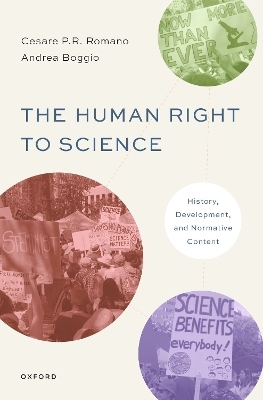
The Human Right to Science
Oxford University Press Inc (Verlag)
978-0-19-776899-0 (ISBN)
The Human Right to Science: History, Development, and Normative Content offers a thorough and systematic analysis of this pivotal human right. After discussing the aims, methodology, and key definitions, the book examines the historical origins of the right to science, from the American Declaration of Human Rights to the Universal Declaration of Human Rights and the International Covenant on Economic, Social, and Cultural Rights. It then turns to mapping the development of the right within the United Nations system (including UNESCO) and its spread to regional regimes. Finally, the book breaks down the normative content of the right to science into twenty-two distinct rights, grouped in four clusters: the right to scientific progress, to responsible scientific progress, to participate in scientific progress, and to benefit from scientific progress. For each, the book describes in detail the legal basis, content, corresponding obligations, and indicators. The book closes by recommending the adoption of a Science Treaty to fully realize the potential that the human rights framework can offer to the regulation of science and technology.
Authored by two leading experts in international law and science policy, The Human Right to Science meticulously explores the right's origins, development, and normative content. In doing so, it uncovers previously unarticulated entitlements and obligations, offering new insights on human rights interconnections.
Cesare Romanois a Professor of Law at Loyola Law School, Los Angeles (Loyola Marymount University) and a W. Joseph Ford fellow. Between 1996 and 2006 he created, developed, and managed the Project on International Courts and Tribunals, a joint undertaking of the Center on International Cooperation, New York University, and the Centre for International Courts and Tribunals, University College London, becoming a world-renowned authority in the field of international adjudication. In 2011, he put his knowledge of the law and procedure of international adjudicative bodies to the service of victims of human rights violations. He founded the International Human Rights Center at Loyola Law School, Los Angeles, and, since then, has litigated dozens of cases before variousinternational human rights bodies, including the first case to claim violation of the Right to Science (CESCR, S.C. and G.P. v Italy, 22/2017). In 2018, Professor Romano co-established Science for Democracy, a Brussels-based NGO whose goal is to promote the human right to science and the rights of science, and he has been the organization's Secretary General since 2023. Andrea Boggio is a Professor of Legal Studies in the Department of Politics, Law, and Society and a Fellow of the Center for Health and Behavioral Sciences at Bryant University. Professor Boggio has practiced law full-time both in Italy and the United States, working on litigation involving complex scientific evidence. He joined Bryant University after completing a post-doc in bioethics at the University ofGeneva and teaching applied ethics at Keele University in the United Kingdom. His expertise in the governance of scientific progress and emerging technologies has led to numerous consultancies for international bodies (i.e. UNESCO, WHO, CESCR, and OECD), human rights experts (i.e. the Special Rapporteur on Cultural Rights, the Special Rapporteur on the Right to Education, the Special Rapporteur on Toxics and Human Rights, and the Special Rapporteur on the Freedom of Opinion and Expression), and governments (i.e. Canada and Italy).
Part I: Aims, Methodology and Definitions
Chapter 1: Methodology and Definitions
Part II: The History of the Right to Science
Chapter 2: From the American Declaration to the Universal Declaration of Human Rights
Chapter 3: From the Universal Declaration to the Covenant on Economic, Social, and Cultural Rights
Part III: Mapping the Right to Science in Law
Chapter 4: The UN and the Right to Science
Chapter 5: UNESCO and the Right to Science
Chapter 6: Regional Human Rights Regimes and the Right to Science
Chapter 7: The Right to Science in National Constitutions
Part IV: The Normative Content of the Right to Science
Chapter 8: Finding the Normative Content of the Right to Science: An Introduction
Chapter 9: The Right to Scientific Progress and to Scientific Freedom
Chapter 10: The Right to Responsible Scientific Progress (Scientific Responsibility)
Chapter 11: The Right to Participate in Scientific Progress
Chapter 12: The Right to Benefit from Scientific Progress
Part V: Conclusions
Chapter 13: The Future of the Right to Science
| Erscheinungsdatum | 29.09.2024 |
|---|---|
| Verlagsort | New York |
| Sprache | englisch |
| Maße | 157 x 231 mm |
| Gewicht | 1361 g |
| Themenwelt | Recht / Steuern ► Allgemeines / Lexika |
| Recht / Steuern ► EU / Internationales Recht | |
| Recht / Steuern ► Öffentliches Recht ► Besonderes Verwaltungsrecht | |
| Sozialwissenschaften ► Politik / Verwaltung | |
| ISBN-10 | 0-19-776899-7 / 0197768997 |
| ISBN-13 | 978-0-19-776899-0 / 9780197768990 |
| Zustand | Neuware |
| Informationen gemäß Produktsicherheitsverordnung (GPSR) | |
| Haben Sie eine Frage zum Produkt? |
aus dem Bereich


